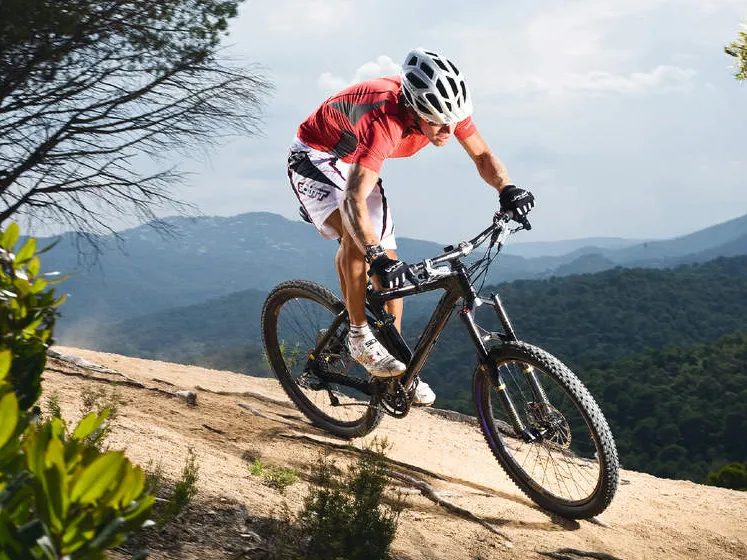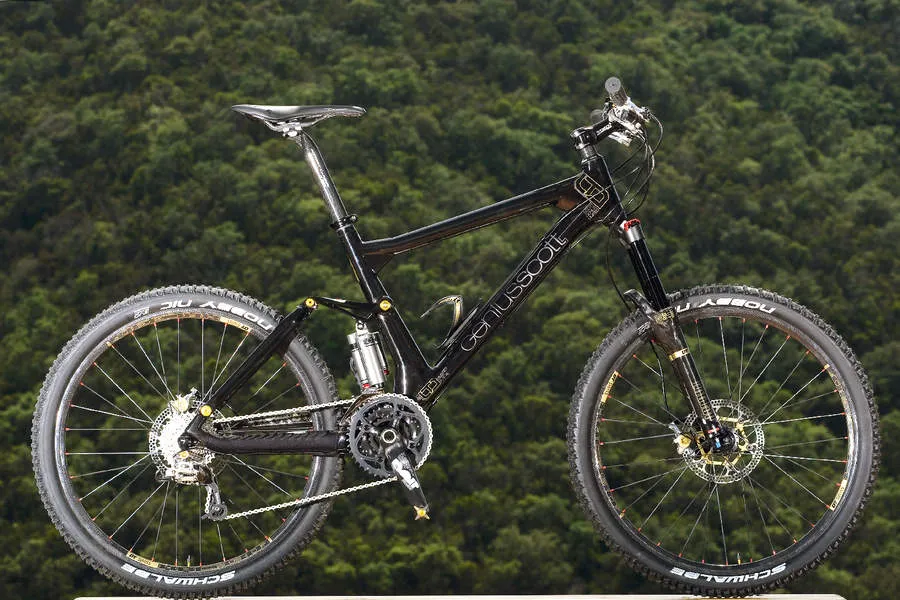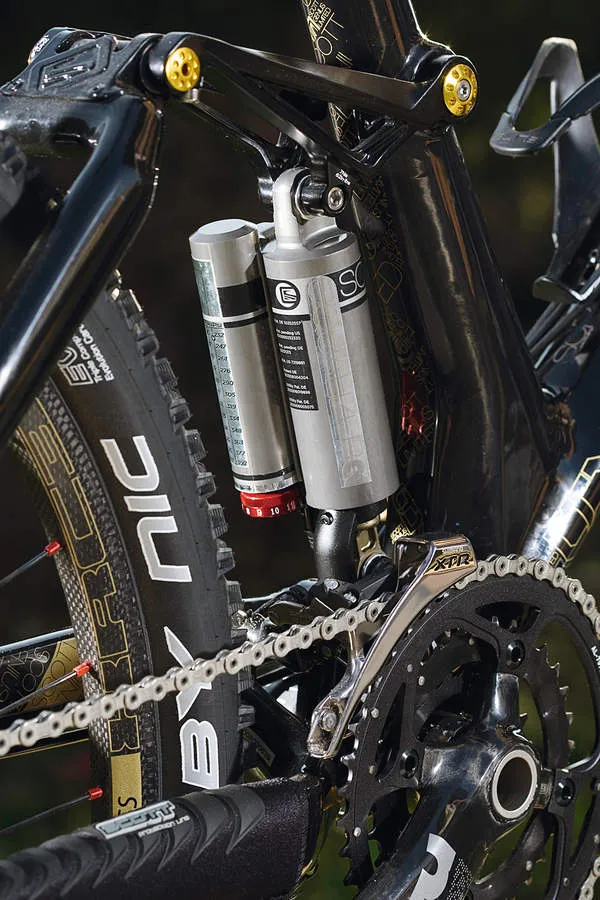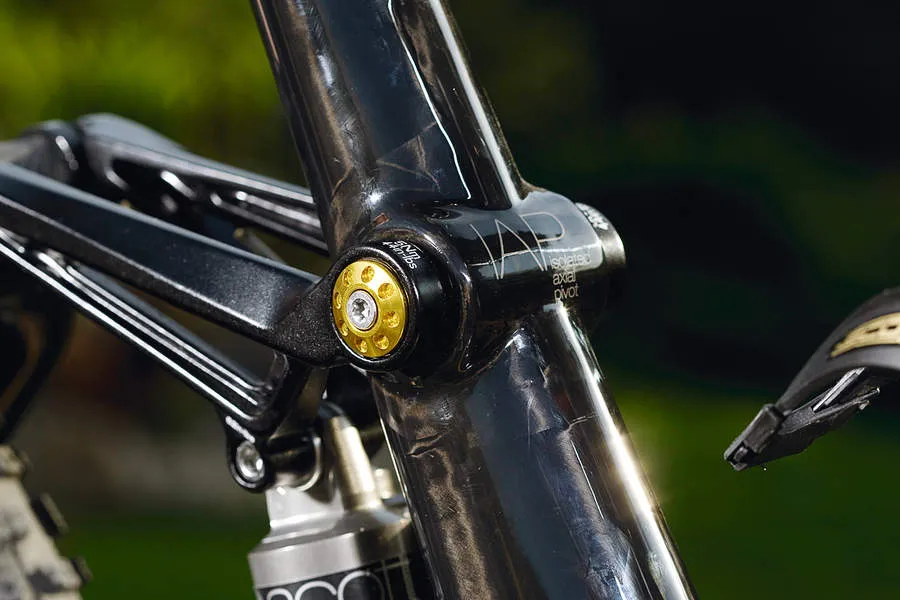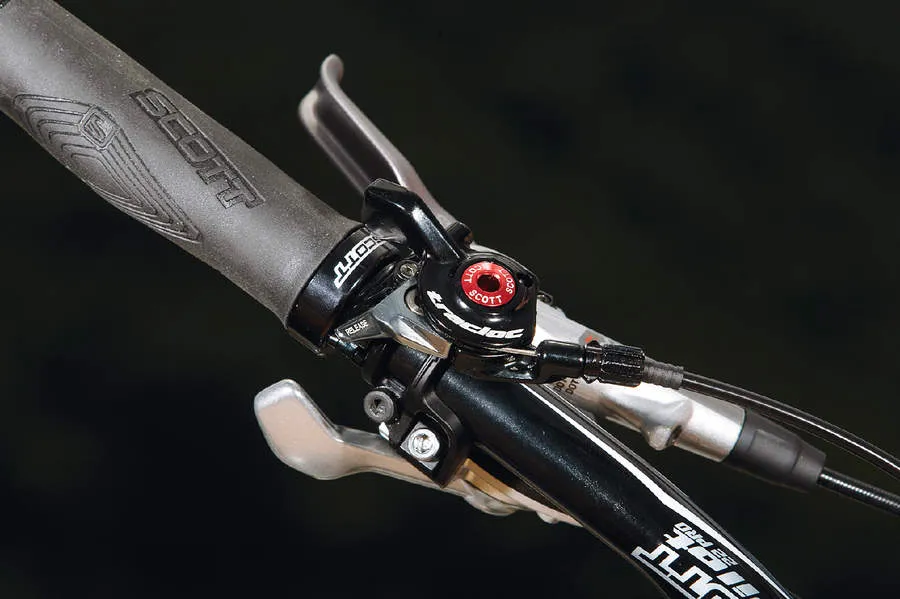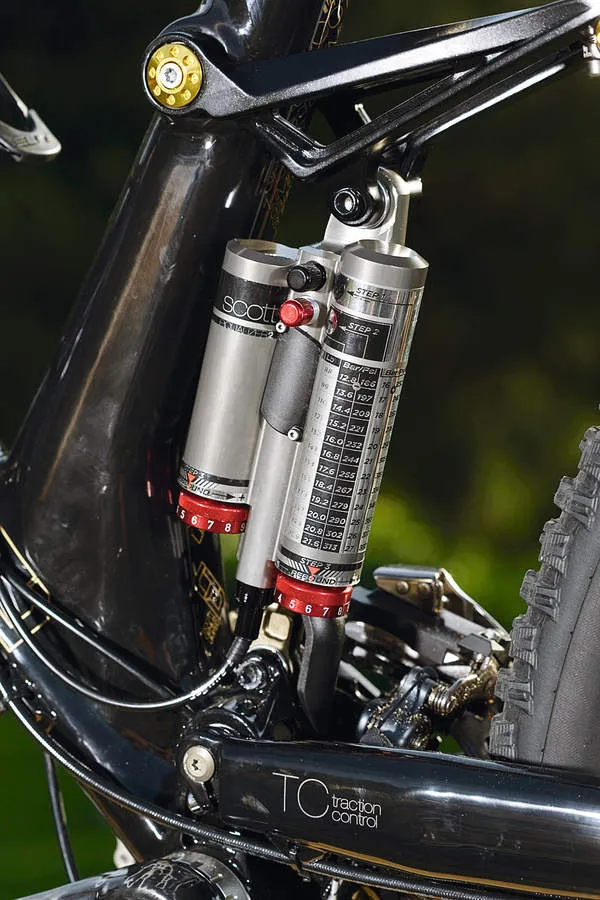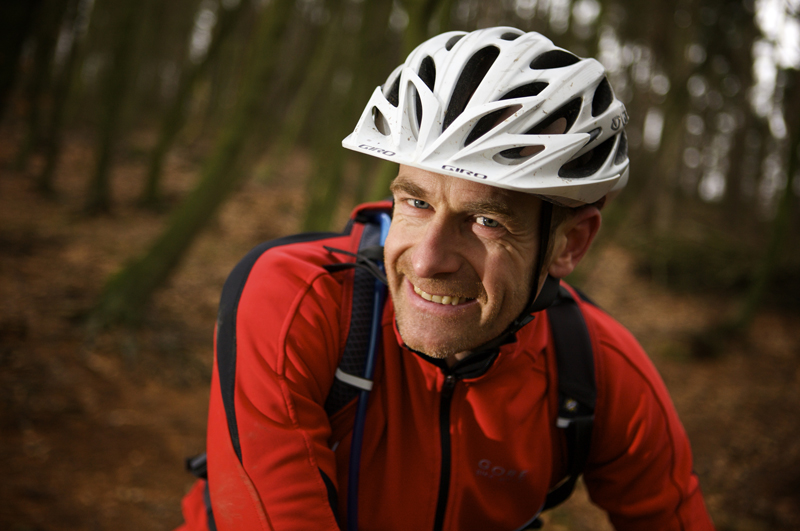With six inches of travel from a feathery-light frame, the latest Scott Genius looks like an exercise in travel vs weight willy-waving. But when you hit the trail – and especially the climbs – you discover that it li9ves up to its name with superb trail-bike performance and ride.
Scott has become synonymous with superlight bikes since the Strike carbon full-susser appeared eight years ago. The new Genius is its most dramatic combination of long travel and extreme light weight so far, but is it a useful real-world bike or just an exercise in record-breaking?
Ride & handling: multiple personalities – but all super-capable
Trying to get to grips the ride of the Genius is much harder than normal, simply because it plays so many tricks with your head.
When bouncing around to set up the suspension, you can see that the front fork is getting the full six inches.
As far as you can tell, the back end is moving a fair way too, although it always feels a tight six inches, not a bottomless one.
With the shock full open it’s got a really planted, corner carving geometry, too, fostering thoughts of semi-freeride foolery.
The ‘trouble’ is that as you pull onto the first dirt road of the day and the usual hillclimb race begins among those with too much testosterone, you are obviously riding a really, really light bike.
Slap down the fork top to drop the travel, and firm or completely lock the rear suspension – depending what’s under your tyres – and it climbs like a really responsive, short-travel race bike.
So what on earth is the trouble with that?
The trouble is that it’s really hard to make the mental switch that’s needed to get the best from the long-travel side of the Genius on the descents if you’ve been pulling the tripe out of people on the climbs.
Because it’s so light, any kind of stiffness or doubt in the rider makes the Scott skip, rattle and ricochet all over the place, further amplifying all the suspension dive and back-wheel kick you get from any six-inch rig when you’re not riding it properly.
The good news is that if you relax into the excellent geometry and handling and leave those powerful brakes alone, it wants to look after you and show you a good time, not launch you into space.
There are times when the shocks patter over small stuff rather than suck onto it, so the Genius skitters and slips where a heavier, plusher bike wouldn’t. Squeeze the Scott down through corners, kickers and bigger boulder sections, though, and this is a seriously fun bike.
The slightly heavier Shimano Deore XT and Fox Fork versions we tried were noticeably better, encouraging us to session the roughest sections again and again.
In other words, this bike has a proper playtime mentality that it wants to share with anyone willing to trust its technical capability and the strength of Scott’s carbon.
Tracking stiffness is certainly on par with much heavier bikes, and never caused us any nervous moments under braking or lost lines on off-cambers.
Although any pedal-induced movement is highlighted by the fact you can switch so easily from locked to pert to fully plush, the movement of rear pivot position from chainstay to seatstay hasn’t made a big difference.
It skids a bit more under braking and clouts square-edged bumps a bit harder, but overall shock response is much better the rest of the time.
The longer centre/shorter ends riding position is a much more intuitive and comfortable fit than the old set-up. The short stem and full-width bar give perfect power steering leverage through the laid-back angles, too.
Frame: long travel, low weight, handlebar-controllable
The numbers are gobsmacking even by current cutting-edge standards. Only Scott’s own Spark 115mm bike and a literal handful of other full-suspension frames come in lighter than the claimed 2250g frame and shock weight.
Yet the Genius rear wheel moves through a full 150mm (6in) from unloaded to fully compressed. It does it via a very complicated and relatively heavy three-chamber shock.
Most of the weight is lost through an extension of Scott’s industry-leading IMP carbon technology.
IMP4 takes the moulded-as-one head tube, down tube and top tube IMP3 lay-up and – guess what – adds the seat tube into the simultaneous make-and-bake chassis, courtesy of some clever removable armature trickery.
Scott also uses the bare minimum of metal to keep weight down. The metal components consist of a one-piece bottom bracket and main pivot section in the bottom corner, plus driveside chainstay head, rear brake shoe, headset races, linkage and cable guides.
Scott isn’t so obsessive about gram shaving that it compromises real-life performance, though. There’s room for a large bottle inside the main triangle on all but the smallest sizes, while the cable routing for gears and rear shock uses a continuous sealed outer, and there’s decent mud room around 2.2in-2.3in tyres.
There are even two rocker link pivots on the outside face of the seat tube, so you can slide the seat post right up or down without interruption.
DT Swiss’s new version of Scott’s unique Equalizer ‘pull’ shock (it extends rather than compresses to absorb impacts) is all about maximising descending and climbing performance.
The chunky, metal bar-mounted remote lever lets you run the three chambers of the shock fully open (50mm stroke), or with one chamber closed (giving a progressive 30mm stroke/95mm travel that Scott dubs Traction Control), or with both side chamber valves shut (locking the shock entirely).
Rebound is also double-adjustable for fine control on the return stroke.
Equipment: top-dollar spec with custom touches
The range starts at £2000 for the sweet-looking, alloy-framed 50. The bike we spent most time on at the Spanish launch, though, was the über-bling LTD.
Light, semi-carbon DT Swiss EXC150 RTLC forks provide matched suspension up front, and production bikes will get a 15mm screw thru-axle version of the RWS system for extra stiffness.
DT also provides the exceptionally light but exceptionally expensive carbon fibre rims, although the hubs are ‘just’ standard 240S units rather than ceramic bearing 190s, so you could go lighter.
A crank change could save you some weight, too, although the carbon Truvativ Team arms are plenty stiff and mesh well with the SRAM X.0 rear mech and shifters.
A direct-mount Shimano XTR front mech solves fit and chainline issues without compromising shifting.
The LTD runs Formula’s stunning new R1 stoppers. They’re lighter than anything else, but with feel and power to rival full-on downhill anchors. The Thomson stem, Ritchey bar and post and new Fizik Tundra XC saddle are premium gear.
Our test bikes were shod with Schwalbe Nobby Nic 2.25in tyres, although production bikes may get Continental Mountain Kings. Both are very light for their size and grip levels, if slightly fragile on rocky terrain.
Verdict: something very special
The way the Genius flies up long fireroad climbs or grunts up trials-style stream ravines will flatter and delight anyone who loves to get to the top first.
Get over the light effect, though, and it’s definitely one of the better-handling technical trail bikes in its category – and the ‘cheaper’ models will probably be better than the salary-savaging LTD.
Add the complete shock control from the bars, the useful practical touches and Scott’s long-term carbon building experience, and the Genius really is something very special indeed.

